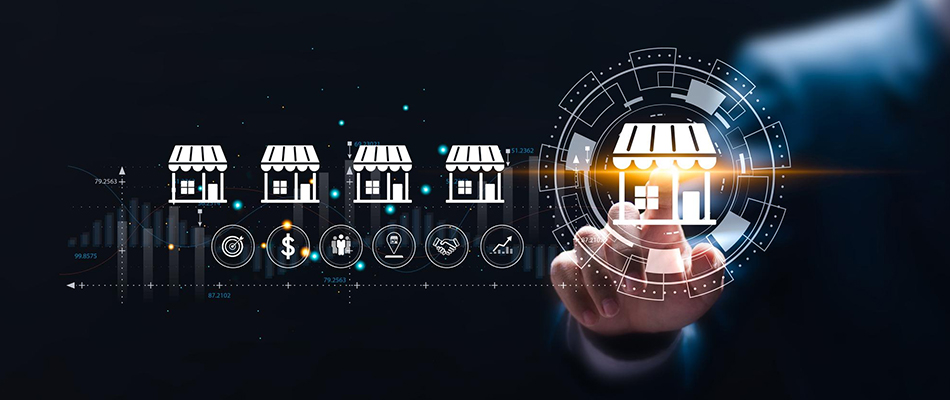When we imagine a career in retail, our minds often paint a picture of cashiers, sales associates, and store clerks – the friendly faces greeting us every time we step into a store. However, the world of retail is vast and multifaceted, it stretches far beyond the familiar shop floors. If you’re wondering why studying retail management is essential, let’s explore its significance in depth.
In this article, we’ll delve into what retail management truly encompasses, how one can climb the ladder to a management role, and where you can acquire the knowledge and skills needed for this exciting career path.
Table of Contents
What is Retail Management?
Retail management is the process of overseeing and directing the operations of retail outlets, including physical stores and online shopping platforms. It involves managing all aspects of a retail business, from the front end that customers interact with, to the back end, including supply chain and inventory management. Here’s a breakdown of what retail management typically encompasses:
- Store Operations: This includes the day-to-day running of the store, ensuring that everything functions smoothly. Tasks involve opening and closing the store, maintaining store presentation, managing point of sale systems, and ensuring compliance with health and safety regulations.
- Sales Management: Retail managers are responsible for driving sales. This involves setting sales targets, motivating the sales team, and devising strategies to increase footfall and conversion rates.
- Customer Service: A key part of retail management is ensuring high levels of customer satisfaction. This includes handling customer inquiries and complaints, providing product information, and ensuring a pleasant shopping experience.
- Inventory Management: Retail managers must keep track of inventory levels to ensure that popular products are always in stock, and to identify which products are underperforming. This involves ordering new stock, managing stock levels, and planning for seasonal changes in product demand.
- Staff Management: Retail managers are responsible for hiring, training, and supervising store staff. They schedule shifts, evaluate staff performance, and ensure that the team is effective and well-coordinated.
- Marketing and Promotions: Part of retail management involves marketing the store and its products. This can include in-store promotions, loyalty programs, advertising campaigns, and coordinating with marketing teams for larger campaigns.
- Financial Management: Retail managers oversee the financial aspects of the store, including budgeting, sales forecasting, and analysing financial performance to identify areas for improvement.
- Supply Chain Management: In larger retail operations, managers may also be involved in supply chain management, coordinating with suppliers, managing logistics, and ensuring the timely delivery of products.
- E-commerce Management: For retail businesses with an online presence, retail management also includes managing the e-commerce platform, which involves overseeing online sales, digital marketing, and online customer service.
Beyond these operational aspects, studying retail management is much more than learning the ins and outs of running a store; it’s about connecting with people’s lives in a meaningful way. Imagine being the person who turns a simple shopping trip into a delightful experience for someone. This is what lies at the heart of retail management – the joy of making someone’s day a little brighter, a little easier.
At the heart of retail management is the art of understanding and enhancing the customer experience. This field of study opens your eyes to the nuances of customer behaviour, teaching you how to engage with people, anticipate their needs, and create an environment that not only meets but exceeds their expectations. It’s about crafting those memorable moments that turn a simple purchase into a delightful experience. This customer-centric approach is more than just a business strategy; it’s a way to bring joy and satisfaction into people’s everyday lives, building loyalty and trust that goes beyond any transaction.
Where Can You Study Retail Management
When it comes to building a career in retail management, choosing the right educational path is a crucial step on your journey. Fortunately, Regenesys Business School offers a variety of programmes tailored to meet your specific needs and ambitions in the dynamic world of retail management.
For those eager to kickstart their journey quickly, the Higher Certificate in Business Management: Retail Management is an excellent choice. This one-year programme is designed to provide specialised knowledge in retail and business fundamentals. It’s not just about gaining theoretical insights; it’s about practical, hands-on learning that sets a robust foundation for your career in retail management.
But if you’re someone who craves a more in-depth understanding of the retail industry, our Business Administration: Retail Management (BBAR) programme extends over three years, offering an immersive and comprehensive dive into the world of retail management. During this programme, you’ll acquire a broad spectrum of knowledge and skills that will prepare you for a multitude of exciting opportunities within the dynamic retail sector.
How Can One Climb the Ladder to a Management Role
Starting with entry-level positions in the retail sector is a common path after completing your education. To advance in your career, focus on these key areas:
- Continuous Learning: Stay updated with the latest retail trends and enhance your skills. Consider enrolling in advanced courses or postgraduate programmes like an MBA to deepen your knowledge and improve your managerial capabilities.
- Mentorship and Networking: Seek guidance from experienced professionals and build a strong network within the industry. These connections can offer valuable insights, advice, and opportunities.
- Leadership and Initiative: Demonstrate your potential by taking on additional responsibilities and excelling in your current role. Showing leadership qualities is essential for moving up the career ladder.
By combining on-the-job experience with continuous education and professional networking, you can effectively progress to a management role in retail.
What Kind of Jobs Can You Get with Retail Management Programme
Completing an HCMBR (Higher Certificate in Business Management: Retail Management) or BBAR (Business Administration: Retail Management) programme opens up a variety of career opportunities in the retail sector. Here are some jobs you can pursue:
- Store Manager
- Assistant Store Manager
- Retail Sales Associate
- Visual Merchandiser
- Inventory or Stock Manager
- Buyer or Purchasing Agent
- Merchandise Planner
- E-commerce Manager
- Customer Service Manager
- Loss Prevention Officer
- Retail Marketing Coordinator
- Supply Chain Coordinator
These positions represent a range of opportunities available in the retail sector for individuals with a background in retail management.
Conclusion
In summary, the importance of studying Retail Management extends beyond the basics. It plays a pivotal role in shaping successful careers, fostering innovation, and driving the ever-evolving retail industry.Top of Form
FAQs
What is the duration of the Higher Certificate in Business Management: Retail Management programme?
The Higher Certificate in Business Management: Retail Management is a one-year programme designed to provide specialised knowledge in retail and business fundamentals.
Is the programme suitable for those with no prior retail experience?
Yes, the programme is suitable for both individuals new to the retail sector and those with some prior experience. It provides a strong foundation for anyone aspiring to excel in retail management.
What educational background is required to enrol in the Higher Certificate program?
Typically, a high school diploma or equivalent is the minimum educational requirement for enrolment.
Can I pursue part-time or online study options for the Higher Certificate in Business Management: Retail Management?
Regenesys offers flexible study options, including part-time and online which is ideal for individuals balancing education with work or other commitments.
What is the Business Administration: Retail Management (BBAR) programme, and how does it differ from the Higher Certificate programme?
The BBAR programme is a comprehensive three-year course that provides an in-depth exploration of retail management, covering a wide range of topics. While the Higher Certificate programme focuses on foundational knowledge, BBAR delves into advanced concepts and strategies.
Are there any prerequisites for enrolling in the BBAR programme?
Prerequisites for the BBAR programme typically include a Matric with Bachelor pass or NQF level 4 equivalent qualification, or a relevant NQF Level 6 qualification from an accredited institution as per SAQA requirements, and basic computer skills. For the Higher Certificate, Matric with certificate or diploma pass and Basic computer skills.
Can I apply for both programmes simultaneously?
It is possible to apply for both programmes, but acceptance into each programme will depend on meeting the respective admission criteria. You may choose to complete the Higher Certificate programme as a foundational step before pursuing the BBAR programme for a more advanced understanding of retail management.







